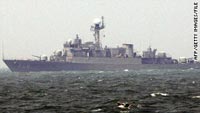 Now that a South Korean investigation has concluded that a North Korean torpedo sank the South Korean Corvette Cheonan killing 46 sailors, the real question becomes, how to respond?
Now that a South Korean investigation has concluded that a North Korean torpedo sank the South Korean Corvette Cheonan killing 46 sailors, the real question becomes, how to respond?
Torpedo accusation raises Korean security stakes
After weeks of investigation and leaks, the announcement that North Korea killed 46 South Korean sailors sets the stage for more hostile relations.
Following weeks of investigation, leaked evidence and diplomatic huddles, South Korea on Thursday publicly accused North Korea of firing a torpedo that sank a naval patrol ship and killed 46 crewmen in March, significantly raising the security stakes on an already tense Korean Peninsula.
The international community responded with concern and condemnation for Kim Jong Il’s isolationist regime. United Nations Secretary-General Ban Ki-moon called the case “deeply troubling,” and Australian Prime Minister Kevin Rudd insisted that the North’s “hostile and unprovoked act” should be met with swift and immediate retaliation.
Yet troublesome questions remain: What response can the South and its allies, including the U.S., give to warn North Korea against further provocations without inciting continued violence? Denying culpability, Pyongyang has already rattled its sabers, warning that any retaliation would lead to “all-out war.”
The U.S Thursday stood behind South Korea, with the White House issuing a statement that said the “act of aggression is one more instance of North Korea’s unacceptable behavior and defiance of international law.”
Citing what it called overwhelming evidence, a joint civilian-military multinational team determined that fragments and markings from a torpedo found amid the wreckage of the downed naval vessel matched that of a North Korean-made weapon already in the South’s possession.
The report concluded that “there is no other plausible explanation” than the North’s involvement.
